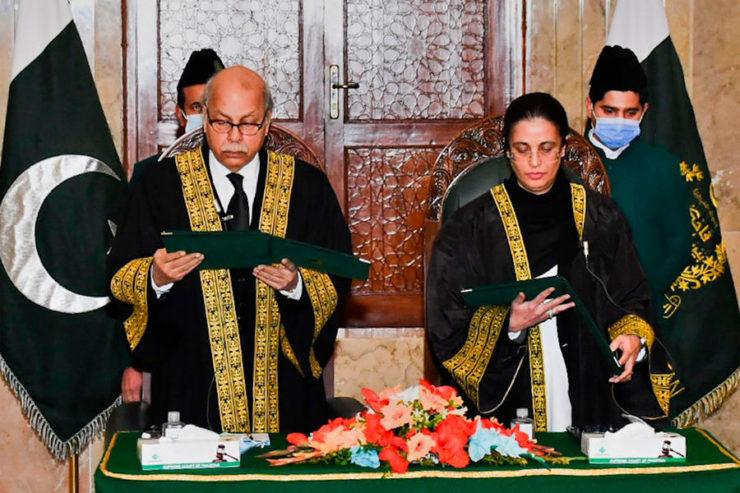
Former Prime Minister of Pakistan and Chairman of the Pakistan Tehreek-i-Insaf (PTI), Imran Khan, finds himself ensnared within the confines of Attock Jail, while his close confidant and two-time former Foreign Minister of Pakistan, Shah Mehmood Qureshi, languishes in custody in Islamabad. Their predicament arises from their alleged divulgence of classified information contained within a confidential cable, colloquially known as the “cipher,” dispatched by Pakistan’s ambassador to the United States. This cipher purportedly laid bare the United States’ intricate involvement in Pakistani politics and its intimate connections with the Pakistani establishment. Initially, the establishment and its mouthpieces vehemently denied the cipher’s existence. However, the fact that Khan now faces charges speaks volumes about the veracity of Khan and Qureshi’s claims.
Imran Khan lodged an appeal with the Islamabad High Court, contesting the legitimacy of his trial within the confines of Attock Jail. His legal representatives articulated before Chief Justice of Islamabad High Court, Amir Farooq, that Islamabad constitutes a distinct jurisdiction separate from Punjab, the province where Attock is located. Therefore, conducting Imran Khan’s trial in Attock Jail without the express permission of the Supreme Court is deemed illegal. Justice Amir Farooq, after careful deliberation, “reserved” his verdict. Astonishingly, within a few hours, the Ministry of Law and Justice reissued an antiquated notification with a fresh date, mandating the resumption of the Cipher case hearing against the former Prime Minister and PTI Chairman in Attock Jail. It is noteworthy that the very notification contested by Imran Khan and his legal team in the Islamabad High Court was reissued almost immediately after Justice Amir Farooq’s “reservation” of the verdict. To date, Amir Farooq has “reserved” his verdict on three separate cases that concern the establishment.
Meanwhile, Special Court Judge Abual Hasnat Zulqarnain proceeded with the in-camera court session for the Cipher case within Adiala Jail, all without securing the special permission of the Supreme Court. Following this closed-door session, the judge extended Imran Khan’s judicial remand until September 26.
Shah Mahmood Qureshi also appeared before a judicial complex with his hands bound in cuffs. His judicial remand was also extended until September 26. Unlike the Sharif family, whose patriarch returned to Pakistan after a four-year sojourn in London, Qureshi has never faced accusations of corruption throughout his political career. However, the establishment’s treatment of the two individuals is strikingly disparate, with one being warmly embraced while the other is subjected to public disrespect.
The subsequent day, Judge Abual Hasnat Zulqarnain presided over the bail petitions of both Khan and Qureshi, ultimately dismissing their pleas. The legal teams of Khan and Qureshi are now poised to appeal to the Islamabad High Court. However, given the recurrent pattern of “reserved” verdicts by Justice Amir Farooq, prospects for respite for Khan and Qureshi appear exceedingly bleak.
This saga of oppression and folly does not culminate here. Numerous political figures were coerced into abandoning Khan’s party following the May 9 debacle. Imran Riaz Khan, a renowned journalist and vlogger critical of Pakistan’s military establishment, mysteriously “disappeared” four months ago due to his unwavering audacity. Such incidents of disappearances have sadly been endemic in Pakistan for decades, disproportionately affecting Baloch and Pashtun citizens advocating for their rights and often linked to the military establishment.
Mian Ali Ashfaq, Imran Riaz’s legal counsel, has signaled that he maintains contact with the shadowy “agencies” responsible for Imran Riaz’s disappearance. This unsettling revelation underscores the profound influence of the military establishment on Pakistan’s judicial system. To be clear, neither Mian Ashfaq nor Riaz’s legal team can be censured, as they are solely endeavoring to secure Imran Riaz Khan’s safety and survival. Regrettably, Pakistan has metamorphosed into a dystopian realm for truth-seeking journalists, particularly since Imran Khan’s ouster exposed the military’s machinations. The chilling fate of the esteemed TV anchor and journalist, Arshad Sharif, who was forced to flee the country due to threats and subsequently met a mysterious demise in October 2022, serves as a grim testament to these perilous circumstances.
The establishment is also actively concocting a fresh case against Khan related to the May 9 attacks, pressuring his close allies to falsely implicate him in the alleged planning of an assault on Core Commander House. Simultaneously, Imran Riaz’s legal team is engaged in negotiations with those responsible for his abduction.
Pakistan and its legal system have become objects of ridicule on the global stage. While the world proclaims allegiance to democracy and freedom, it paradoxically turns a blind eye to the blatant human rights violations within the country. Notably, US Ambassador Donald Blome recently met with Chief Election Commissioner Sikander Sultan Raja, reaffirming the United States’ commitment to free and fair elections conducted in accordance with Pakistan’s laws and Constitution. Similarly, British High Commissioner Jane Marriott conferred with Sikander Sultan Raja, discussing the imperative of conducting free and fair elections in Pakistan. These diplomatic interactions not only raise critical questions about foreign involvement in the country’s ongoing turmoil but also inadvertently lend legitimacy to the Chief Election Commissioner, who is a military puppet.
Taut Bataut – is a researcher and writer that publishes on South Asian geopolitics, exclusively for the online magazine “New Eastern Outlook”.